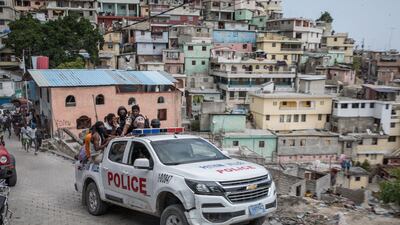Haiti on Thursday asked the UN Security Council for help investigating the assassination of President Jovenel Moise and for maintaining security amid the nation’s ensuing political crisis, according to UN envoy Helen La Lime.
Speaking with reporters after closed-door council talks, Ms La Lime criticised a “cowardly” attack carried out by “commandos” but added that it could take weeks of investigation to establish who the masterminds were.
The council met against the backdrop of Haiti's deepening political and security crisis. Police have killed four of the assassins and captured six others in a manhunt for those who launched the attack on the president's private residence, said Ms La Lime.
“Haiti made a request for assistance with this investigation from international authorities … it is important that these requests be taken seriously,” Ms La Lime said.
“The key is in the next two weeks we've got to really be working in the most effective way to ensure that this investigation moves forward and that the perpetrators of this horrible crime are brought to justice.”
Haiti’s UN ambassador Antonio Rodrigue also called on the 15-nation body for “additional security assistance”, said Ms La Lime, though it remained unclear “exactly what it is that they’re after”.
The UN envoy’s political mission helps Haiti build government institutions and hold free and fair elections, which were set to begin in September. Haiti-based UN staffers may have to become “more dynamic” in response to the crisis, Ms La Lime said.
UN peacekeepers were deployed to Haiti in 2004 after a rebellion led to the ouster and exile of then-President Jean-Bertrand Aristide. Blue helmets assisted the country after the 2010 earthquake and the mission was shuttered in 2019.
Ireland's UN Ambassador Geraldine Byrne Nason on Thursday condemned the “shocking, brutal murder of a president” that had left the poorest nation in the Americas in a “dark hour”.
“We want to understand what happened,” Ms Nason told reporters.
“We're also concerned about the political and security implications on the ground."
In Haiti, police were hunting for more gunmen behind the assassination of President Moise.
Security forces engaged in a shootout with the suspected assailants in the capital early on Wednesday after the overnight attack at the president's private residence.
Ms La Lime. also described a “larger group of possible perpetrators [who] have taken refuge in the two buildings in the city, and that they are now surrounded by the police”.
There was no immediate information on who killed the president or why, or who may have ordered the assassination.
The president’s apparent lack of security has raised questions about the strike being led by political rivals.
The streets of the capital Port-au-Prince were tense, and shops, banks and gas stations closed. The city’s main airport was closed, as was the border with the Dominican
Republic.
The country now has no president or working parliament, and two men claim to be in charge as prime minister.
Gangs that regularly kidnap people for ransom control parts of the capital.
The country is observing two weeks of mourning for the death of Mr Moise.
Interim Prime Minister Claude Joseph declared a national "state of siege" and said he was now in charge.
Mr Joseph has only been in his post as prime minister for three months, and was due to step down within days after Mr Moise named a replacement on Monday. His legitimacy to serve has been questioned.
Mr Moise's wounded wife Martine was treated at a local hospital then rushed by air ambulance to the Ryder Trauma Centre in Miami.
During the hit, a maid and another domestic staff member were reportedly tied up by the commandos who allegedly shouted "DEA operation" as they burst in.
Haiti's ambassador to Washington, Bocchit Edmond, said the killers were "professional" mercenaries disguised as US Drug Enforcement Administration agents.
US President Joe Biden condemned the killing as “horrific” and said Washington was ready to assist in any way.


